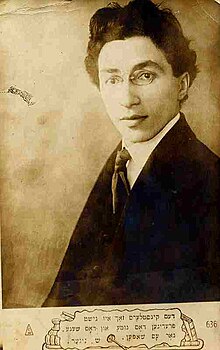| This article needs additional citations for verification. Please help improve this article by adding citations to reliable sources. Unsourced material may be challenged and removed. Find sources: "Shmuel Niger" – news · newspapers · books · scholar · JSTOR (October 2023) (Learn how and when to remove this message) |
| Shmuel Niger | |
|---|---|
 | |
| Born | Shmuel Charney 15 June 1883 Dukora, Minsk Governorate, Russian Empire |
| Died | 24 December 1955, age 72 New York City, New York, US |
| Nationality | Russian Empire, United States |
| Other names | Samuel Niger, Samuel Charney, Shmuel Ṭsharni |
| Occupation | Yiddish literary critic |
Shmuel Niger (also Samuel Niger, pen name of Samuel Charney, 1883-1955) was a Yiddish writer, literary critic and historian and was one of the leading figures of Yiddish cultural work and Yiddishism in pre-revolution Russia.
Life
Shmuel Niger was born Shmuel Ṭsharni on 15 June 1883 in Dukora, a small village in Minsk Governorate, to Zev Volf and Brokhe Tsharni (née Hurwitz). His father, a fervent Lubavitcher Hasid, died in 1889, leaving Shmuel’s mother a widow with five sons (he being the third) and a daughter. Niger’s two younger brothers also achieved renown. Baruch Charney Vladeck (1886–1938) became a leading socialist agitator and theoretician, general manager of The Jewish Daily Forward and New York City alderman while Daniel Charney (1888–1959) was a celebrated Yiddish poet, writer and journalist.
Niger was a child prodigy, studying Talmud until the age of 17 at yeshivas in Berezin and Minsk. He was preparing for rabbinic ordination when he instead moved into the secular and political world, having become attracted to secular culture and Zionism. In 1904, he co-founded the Zionist Socialist Workers Party, and was a writer for the party paper Der nayer veg (The New Path). He was imprisoned and tortured for his political activity several times in Minsk, Kiev, Warsaw, Daugavpils (Dvinsk), Odessa, and Vilna, but he avoided execution after the intervention of family and friends.
Literary career
After initial literary forays in Russian and Hebrew, he wrote, published and worked as an editor for many different Yiddish periodicals in Vilna, St. Petersburg and Moscow. His 1907 essay on Sholem Asch's drama Meshiekhs tsaytn (The Age of the Messiah) was his first significant Yiddish critical article and also helped to introduce the still relatively unknown Asch to a much broader audience. In 1908, together with the Bundist dramatist A. Vayter and the Zionist essayist S. Gorelik, he founded the short-lived journal Literarishe Monatshriftn (Literary Monthly Journal) in Vilna, which is widely credited with having launched the Yiddish literary renaissance. The journal, while only publishing four issues, contained works of the bright young hopefuls of Yiddish literature, including Sholem Asch, Dovid Einhorn, Peretz Hirshbein, Hersh Dovid Nomberg, and Der Nister. Niger’s own essays on Asch, Nomberg, I. L. Peretz, and Avrom Reyzen set the high literary tone of the journal and heralded a level of literary and critical sophistication unprecedented in Yiddish literature.
Assisted by Ber Borochov, he edited Der Pinkes (The Record Book, 1913), the first Yiddish scholarly volume devoted to the study of Yiddish literature, language, folklore, criticism, and bibliography. He also edited Zalman Reisen's Leksikon fun der Yidisher Literatur un Prese (Lexicon of Yiddish Literature and Press, 1914). These volumes helped to lay the foundation for the scholarly study of the Yiddish language and literature.
In America
In autumn 1919, Niger immigrated to the United States, where at first he worked at The Jewish Daily Forward (where his brother Baruch was manager), and a few weeks later at the Yiddish liberal daily Tog (Day), for which he worked until his death in 1955. He became the leading critic of Yiddish literary life, writing weekly reviews of books and articles on literary trends for Tog. He also co-edited the literary monthly Di Tsukunft from 1941 to 1947. Although the bulk of Niger’s literary criticism, mainly consisting of articles and essays from journals and newspapers, was never collected and published in book form, a bibliography compiled by Efim Jeshurin lists 4,083 items by Niger and 1,607 items about him.
Niger died in New York City on 24 December 1955, returning from a YIVO Executive Committee meeting. His funeral was attended by well over 1,000 people and news of his death led to the publication in the Jewish press of hundreds of articles about him worldwide. He was buried at Mount Carmel Cemetery in Queens, New York.
References
- ^ Moseley, Marcus (2010), "Niger, Shmuel", YIVO Encyclopedia of Jews in Eastern Europe, retrieved 2013-08-13
- "Niger, Shmuel". Leksikon fun der nayer Yidisher literatur.
- Leyb Vaserman, "Niger, Shmuel,” in Leksikon fun der nayer yidisher literatur, vol. 6, cols. 190–210 (New York, 1965)
- Joshua M. Karlip (1 June 2013). The Tragedy of a Generation: The Rise and Fall of Jewish Nationalism in Eastern Europe. Harvard University Press. p. 36. ISBN 978-0-674-07494-1.
- Liptzin, Sol; Trachtenberg, Barry (2007), "Niger, Shmuel", Encyclopaedia Judaica, 15: 262–263, retrieved 2013-08-15
- ^ "Samuel Niger-Charney, Noted Jewish Critic, Dead; Funeral Wednesday", JTA, 1955, retrieved 2013-12-18
- Anthony Pym; Miriam Shlesinger; Daniel Simeoni (13 March 2008). Beyond Descriptive Translation Studies: Investigations in homage to Gideon Toury. John Benjamins Publishing Company. p. 67. ISBN 978-90-272-9167-7.
- Jeshurin, Ephim H., Shmuel Niger-bibliografye, YIVO, (New York, 1958)
- "Samuel Chaney, A Yiddish Author – President of World Jewish Cultural Congress Dies – Used Pen Name S. Niger". New York Times. Retrieved 6 November 2017.
External links
- Guide to the Papers of Shmuel Niger at the YIVO Institute, New York, NY
- Bromberg, Eli. “We Need to Talk about Shmuel Charney.” In geveb, October 2019.